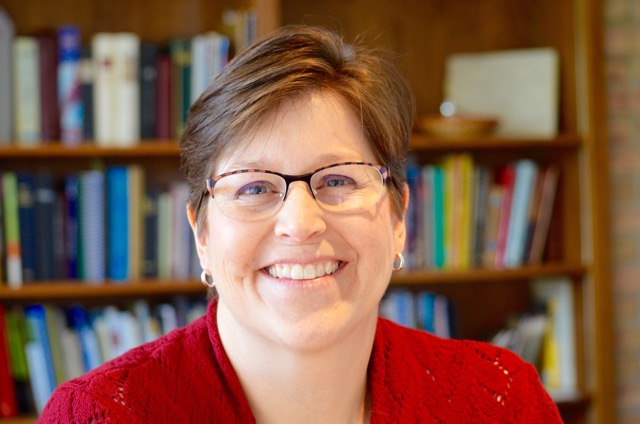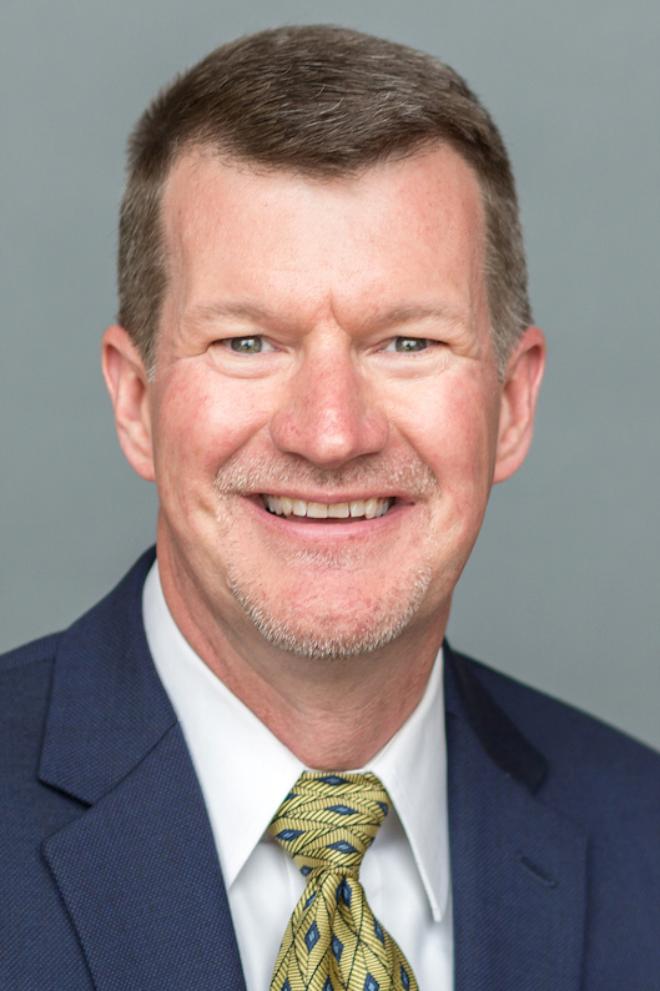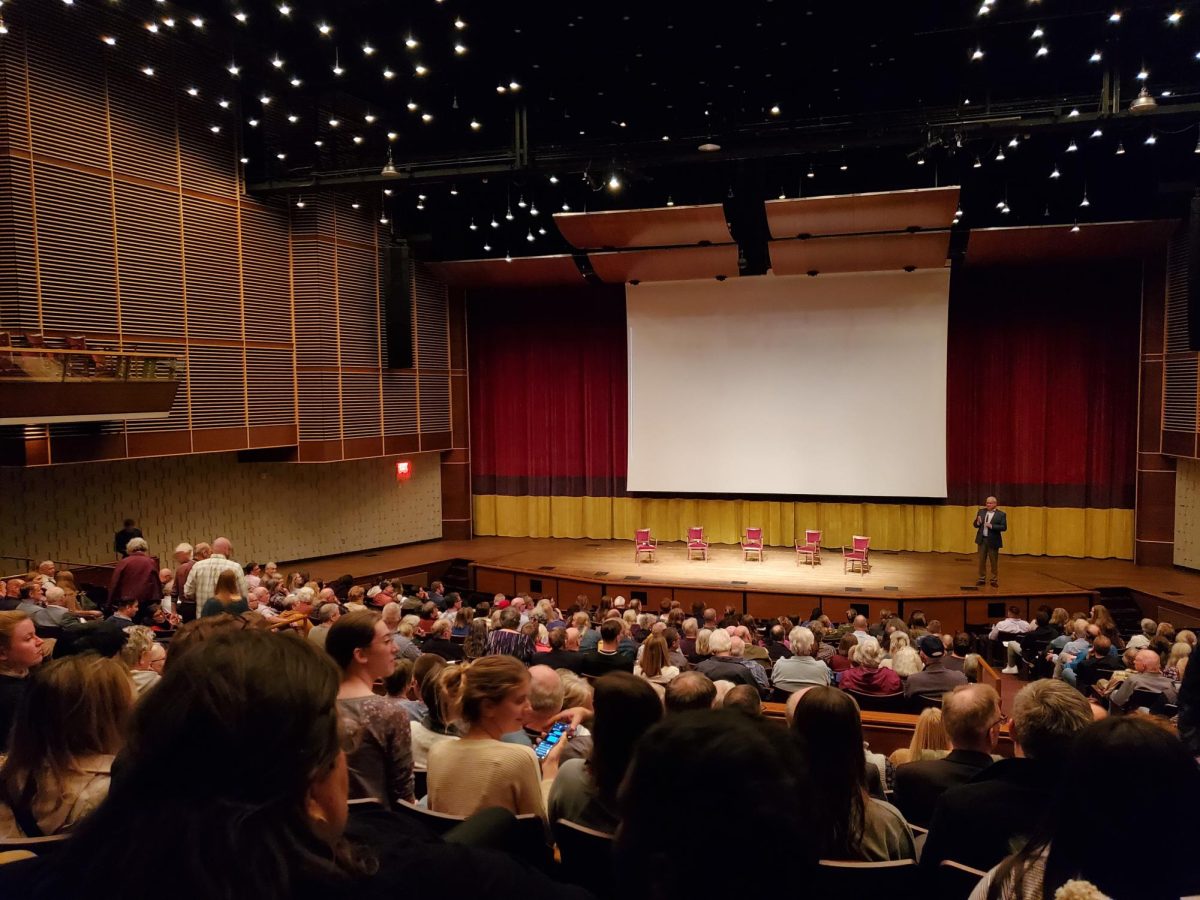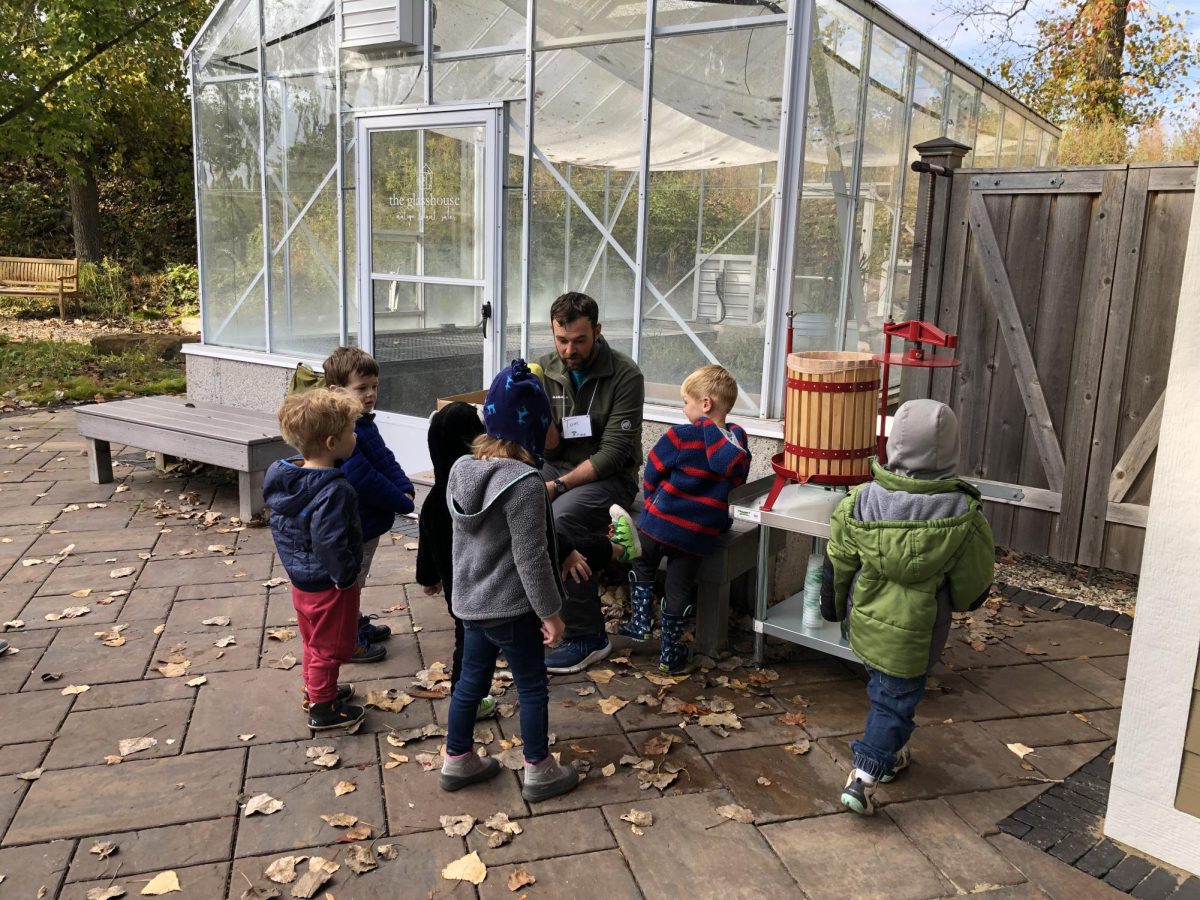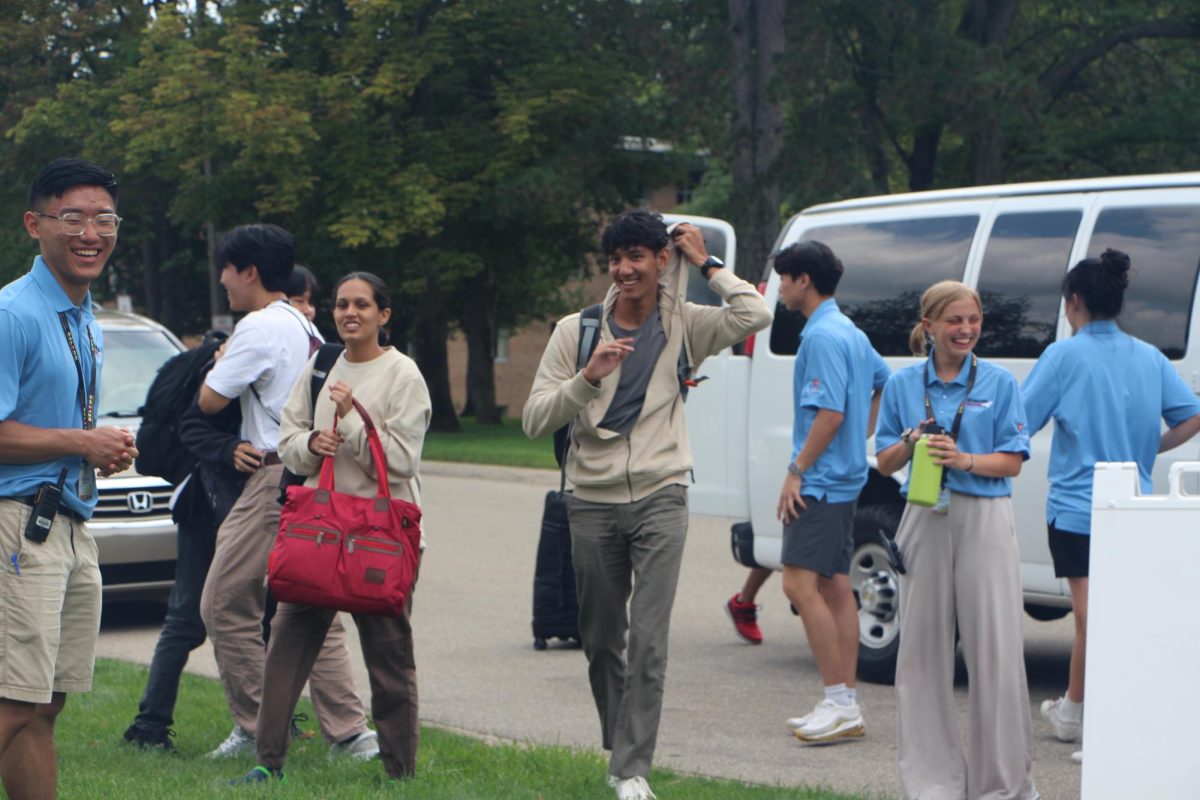Beloved college chaplain Mary Hulst, known commonly as Pastor Mary, is very visible all around campus — talking to students, attending meetings, going to sports events and, most importantly, preaching at LOFT. Chimes sat down with her to talk about her job as chaplain, some of the struggles she’s faced and who she is as a person. Here’s what she said.
Chimes: How did you end up at Calvin College?
Hulst: I was a pastor for eight years here in town, and then I earned my Ph.D. from the University of Illinois. Then, I was actually a professor for one year in the communications department on a term appointment and then got a job as a professor at the seminary. It was the beginning of the second year in that job when this job opened up. I thought, “Man, I’ve barely been at my teaching of preaching job for a year — it’s kind of fickle to just be like, ‘Well, this job looks better; I want to take that job.’”
But one day, when I was in the process of discerning, I had three colleagues of mine from all over North America write to me on the very same day, and say, “I saw this posting and I immediately thought of you.” I thought, “Well, these are three people who I’m not in contact with a lot, but they know me,” and I thought, “Well, that’s good data to say God’s up to something.” So then, I applied in November and then I got the job in the very end of February: I started here in 2009.
Chimes: Do you have a favorite memory of being chaplain at Calvin College?
Hulst: They all have to do with watching students grow. Watching students who come in with a challenge, or they’re presented with something while they’re here — that’s difficult, and [I love] seeing them become stronger, more reliant on God, more understanding on what faith is and what it requires of them. There are times where I watch students walk for graduation and I think “Wow. Look at what God has done in you in four years.”I’m flooded with images of students who I’ve seen God work through. So that’s the best part of the job.
Chimes: What made you decide to go into ministry?
Hulst: Great question. When I was in seventh grade, I had a pastor who said to me after a catechism class one Wednesday afternoon, “You’re going to be a minister.” I was like “What?” because at the time the church I was part of didn’t even ordain women as deacons, let alone elders or pastors. He planted a seed. He left our church when I was in eighth grade but would come back every summer to preach, and he would say, “So, are you getting ready to go to seminary? Are you getting ready to do this?”
During high school, I spent a lot of time looking into Reformed hermeneutics, and how we approach scripture and why women haven’t been pastors. By the time I graduated from high school, I not only had a good understanding of how the Reformed Church has approached these issues scripturally, but I also felt more and more like this was something that I really felt called to do.
By the time I got to Calvin, I majored in classics and took the pre-seminary course, and I was really involved in the worship life of the college, and off it goes from there.
Chimes: As the second woman ordained in the CRC church, did you face any obstacles trying to become a pastor, and did you ever feel overwhelmed and or like giving up in that journey?
Hulst: Yes, definitely there were obstacles. A few days after I was ordained, I got hate mail from people who said I was being disobedient and sinful and needed to repent. When I was in college I had classmates who didn’t understand. I had a young man who said to me, “Why don’t you just be a pastor’s wife?” I said, “That’s not the call. Why don’t you just be a pastor’s husband?” He kind of looked at me and I said, “It’s a different call; that’s not what God’s wired me for.” When I had an internship out in Colorado, there were people who would call the church on Friday and find out if it was me preaching or if it was the senior pastor preaching, and if I was preaching they wouldn’t come. Those are just some examples of the obstacles.
But, at every point where I faced an obstacle, or someone said something unkind, within 24 hours there would be an affirmation that I was doing exactly what I needed to be doing.
Chimes: As chaplain of so many students, is every day an emotional rollercoaster??
Hulst: I care deeply for this community, for students, staff and faculty. So I carry the sorrows of everybody with me, but I’m also very aware that I’m not able to fix them, and it’s a prompt towards prayer. I say, “Lord, these are your beloved children, please take good care of them, and please help me to do my best on your behalf here.” I have people who keep me grounded and help me think through things and are praying for me. That’s really important too.
Chimes: Is there something about what you do that would surprise students?
Hulst: I’ll hear from students, “I walked by your office and you weren’t there.” That happens a lot, because I’m in meetings all over campus for different things. I have meetings where I’m supervising my staff, whether as a group or one on one, or I’m in student life, or I’m in the president’s cabinet.
There’s a lot of my time that’s spent thinking about the college as a whole or thinking about my department — what are we doing and where are we moving towards; how do we achieve the goals that we’ve laid out for ourselves. Students need to know that when I’m not in my office it’s because I’m in a meeting somewhere, and I think they’d be surprised by the amount of time that that takes. But I’d rather be with them.
Chimes: During a LOFT last semester, you mentioned a post you saw on Yik Yak, which startled many students. Do you often times check up on Yik Yak and similar forums?
Hulst: Yes, although I find Yik Yak troubling sometimes — and it’s difficult because I can’t respond. There are people who post things that are painful, or troubling, and I’ll think, “We can help you with that, you know; if you came to me, if you came to a counselor Broene, if you spoke to one of your professors — you have people.” I read Yik Yak to be reminded of what students may not have the courage to say out loud. It shapes my preaching, it shapes my prayer life. But I can’t read Yik Yak very often or I’ll just be sad.
Chimes: How do you prepare for LOFT?
Hulst: Paul Ryan and I chart out the preaching calendar for an entire semester at a time. I already know what I’m preaching on from now until the end of school. On Saturday mornings, I get up and go to my study, and I pray, read commentaries, brain storm. I have an actual, physical notebook, and I write down a whole bunch of ideas that have to do with the passage, pastoral needs of the community, what’s happening right now, what’s happening globally, what’s happening in Grand Rapids — gathering all the resources together.
By about 1 to 3 in the afternoon, I’ve come up with a pretty full outline of how I think the sermon is going to go. And then I’ll step away from it. I get to about 2 or 3 in the afternoon and my brain is just done.
I go back up on Sunday afternoons at two to see what I’ve got. I edit it, refine it, and then I practice the sermon out loud at least four times before I preach at LOFT, since I preach without notes. That helps me really hone it. On Sundays I work from about 2 until about 10:30 — and then Mondays I’m off.
Chimes: You recently published a book. What inspired it?
Hulst: I did! This is a funny story. Two years ago, I was at the worship symposium book store, which is on the second floor of the CFAC. I was walking by the InterVarsity Press table, and I picked up a bunch of books, and I was checking out, and the person looked at my pile of books and said, “You must be a pastor, because you have an assortment here of history and biblical studies and pastoral stuff.” I said, “Yeah, actually I’m a pastor here,” and I gave him my quick thumbnail bio He said, “I should get a book proposal from you.” I thought, “This is odd, people at the checkout counter do not ask that.”
He gave me his card and I went home and thought about it I’ve taught preaching, I’ve done workshops on preaching, and there are a lot of strong, homiletical books of theory, like the ideas about preaching. I thought, “There are so many of us who just need a really practical book about preaching.” There are so many more people who are coming to preach without having a seminary degree. A lot more lay preaching, a lot more associate pastors, who haven’t gone to seminary. What tool can I put in their hands that will help them? I shaped an idea, sent the proposal off, and, to make a long story short, they actually accepted it.
Pastor Mary’s book, A Little Handbook for Preachers, will be available in May. You can preorder her book for 50 percent off with promo code: 611-28. Expires 4/30/16.
Chimes: What is one important lesson you’ve learned from being a pastor?
Hulst: God is always up to something. Sometimes you need to point that out for people who don’t believe that, and sometimes you need to have that pointed out for you. Because there are frustrations in pastoral ministry, there are griefs in the hearts of people you love, and you have to be able to bring hope to people. That doesn’t come from you; that comes from the gospel. Reminding people that God is up to something and his plan is not yet over for this world is a really important lesson we all need to remember.
Chimes: What do you do in your free time?
Hulst: I love to read, I love to download novels onto my Kindle from the library and keep reading. When the weather is better, I love to get outside, I love to hike, I love to camp. I run, I swim. I was on the swimming team at Calvin. During the winter I swim a little bit more, and during the summer I run a little bit more. My husband and I like to travel, to explore — we did this great road trip to Yellowstone last year. I love to kayak, love to do outdoor stuff.
Chimes: Lastly, do you have any advice for Calvin students?
Hulst: Tons of advice! I think the big thing would be to remember that you don’t have to have all of your life figured out by the time you’re 22. So don’t worry about it. Study what you love, get a major you enjoy and let God take care of everything else. You cannot guarantee yourself a happy life with the decisions you make when you’re 20. So be concerned more with being faithful than being successful.
This interview has been condensed and edited.




